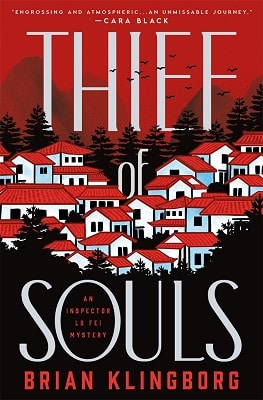Book Review
Thief of Souls
Brian Klingborg
reviewed by Lou Jacobs
An immersive police procedural involving a serial killer, with a healthy dose of humor, history, philosophy, and an unbridled rich characterization. The setting is contemporary Communist China, in which ethical Inspector Lu Fei faces the challenge of seeking justice in a complex and corrupt society.
Inspector Lu Fei is a graduate of China’s top police university, yet finds himself entrenched in a small backwater provincial town of Raven Valley Township, where major crime is a rarity. This “promotion” position is a result of an unfortunate confrontation with his corrupt boss of the Harbin City Police Department, when Inspector Lu Fei, executing an unscheduled raid, found his boss engaged in the service of an underage prostitute.
Lu Fei is enjoying a cup of Shaoxing wine at his neighborhood bar, The Red Lotus, when his cell phone rings. This breaks him from the reverie of admiration and desire for the beautiful owner, Yanyan (a harbinger of future conflict), summoned to a murder scene. There, a young woman, Yang Fenfag, was found brutally murdered in her bathroom by a neighbor, who came over to complain about the incessant barking of her dog.
Inspector Lu is confronted by a corpse with ligature marks on the wrists and welts around the neck, dressed in yellow silk button-up dress and made-up with powder on the cheeks, lipstick, and eyeshadow, looking like a porcelain doll with her cold, dead eyes staring upward. His search of the house is fruitless, without obvious signs of struggle; no blood, no mess. He enlists the aid of the forensic team from the CID in Beijing which consists of Deputy Director Song, a rising political star in the complex authoritarian hierarchy of the Chinese police department, along with two crime technicians and the inimitable Dr. Ma, the medical examiner. A unique and richly developed character, Dr Ma Xiulan is one of only a few woman to achieve a high position in the forensic field. Author of a controversial book that criticizes the current state of forensics in China, her work maintains that it is slipshod and subject to political tampering. Her book jacket contains a photo of her in full make-up and a low-cut blouse, offering a significant amount of cleavage.
With the aid of Song and Dr. Ma, it is revealed the victim has been bludgeoned by a hammer, violated, and has had her heart, lungs, and liver harvested. And, stuffed into her mouth is a single pledget of joss paper, also known as spirit money or Hell money. According to Chinese folk religion, in the afterlife the soul requires money to buy needed essentials. After a loved one dies, relatives and friends make these paper offerings in a show of love and devotion, something like making a deposit in a spectral Venmo account. These notes are signed in front by the Jade Emperor and in back by Yan Wang, the god of death and ruler of the netherworld. Lu Fei opines that the heart, liver, and lungs are imbued with some aspects of the soul or spirit. Perhaps by removing them, the killer is trying to “steal her soul.”
In the early stage of investigation, a shadow is cast upon an old high school boyfriend of Fenfag. A simple, not too bright male, Zhang was noted to follow her around in high school like a lost little puppy. Although there is no known history of violence, he is physically imposing, socially awkward, and is employed in a position where he butchers pigs at a processing plant. Lu Fei is pressured by the local government bureaucracy to arrest and charge him for the murder. He will not be rushed and methodically pursues for a full investigation. He is a true rarity, as the average Chinese citizen has been exposed to hundreds of years of corruption, abuse, and incompetency in their police force. Some, referring to the character of Inspector Lu, indicate he is as rare as a Qilin, the Chinese unicorn.
In Thief of Souls, Brian Klingborg provides a masterful and immersive narrative creating a riveting twisted string of reveals that propels this page turner onward. Most chapters begin with a quote from Chairman Mao Zedong, espousing socialist dogma and virtues that will be deconstructed in the chapter, while providing further insights into the realities of modern China. Several chapters involve the inner thoughts of the unidentified killer, slowly revealing his motivations.
The resourceful and ethical Lu Fei will not be deterred in his investigation to bring. He forms an unlikely friendship and alliance with Deputy Director Song that proves mutually beneficial. This novel will appeal to fans of beloved Detective Bernie Gunther from the pen of Philip Kerr and Deon Meyer’s equally enjoyed Detective Benny Griessel. Klingborn’s knowledge of East Asian Studies and his experience with living and working in Asia are on full display in this fascinating tale.
Thanks to NetGalley and St. Martin’s Press (Minatour Books) for supplying an Uncorrected Proof in exchange for an honest review.
More Police Procedurals
Advertisement







